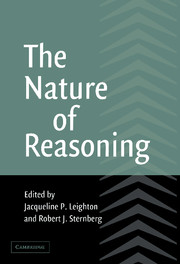Book contents
6 - Strategies and Knowledge Representation
Published online by Cambridge University Press: 05 July 2011
Summary
Logic, computer science, artificial intelligence, psychology, and linguistics all study human reasoning. Unfortunately, much of the insight into reasoning gained by these methods has not spread beyond the rather stringent bounds of each discipline. As a result, the study of human reasoning has suffered from balkanization. This chapter rethinks the relationship between theory, formalization, and empirical investigations to bring a more interdisciplinary approach to human reasoning. We will show that combining these fields of study clarifies the nature and status of knowledge representation in reasoning, and highlights the strategies underpinning variations in performance, raising new empirical questions, and backgrounding others.
So, why include logical studies in human reasoning? Logic had its origins in attempting to provide agreement about which arguments are acceptable. Aristotle was concerned that those who were good at arguing could convince an audience of the truth of an argument, irrespective of how valid the argument itself was. Rhetoric would get the upper hand over truth. He specified a formal system of reasoning – the syllogistic form – to reflect which patterns of argument ought to be accepted, and which ought not. Logic, then, developed in classical Greece, as an educational technology for teaching people to learn and to communicate, chiefly in the professional practices of law and politics.
- Type
- Chapter
- Information
- The Nature of Reasoning , pp. 129 - 168Publisher: Cambridge University PressPrint publication year: 2003
- 2
- Cited by



